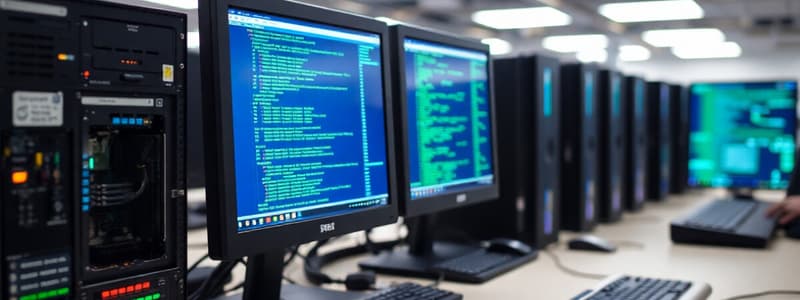Podcast
Questions and Answers
Which of the following number systems can be directly converted to binary?
Which of the following number systems can be directly converted to binary?
What is a key characteristic of a motherboard in a computer?
What is a key characteristic of a motherboard in a computer?
Which of the following best describes a LAN?
Which of the following best describes a LAN?
Which of the following components is essential for digital signaling in a computer network?
Which of the following components is essential for digital signaling in a computer network?
Signup and view all the answers
What does IMEI stand for in mobile technology?
What does IMEI stand for in mobile technology?
Signup and view all the answers
Which of the following represents a characteristic of social media security issues?
Which of the following represents a characteristic of social media security issues?
Signup and view all the answers
What is the primary purpose of network firewalls?
What is the primary purpose of network firewalls?
Signup and view all the answers
Which of the following statements about a compiler and an interpreter is true?
Which of the following statements about a compiler and an interpreter is true?
Signup and view all the answers
Study Notes
Unit 1: Introduction to Number Systems and Computing Fundamentals
- Number Systems: Binary, octal, decimal, hexadecimal; conversions between them
- Binary Representation: Signed and unsigned binary numbers
- Data Representation: ASCII and UTF standards
- Computer Concepts: Definition, history, evolution, key terms
- Computer Architecture: Hardware and software components
- Programming Fundamentals: Programming languages, compilers, interpreters
Unit 2: Computer Hardware and Operating Systems
- Computer Hardware: Components (motherboard, processor, memory, storage), primary and secondary storage devices, networking components
- Operating Systems: Introduction, booting process, types (Windows, Linux), file systems
Unit 3: Computer Networks and Internet
- Computer Networks: Definition, digital and analog signaling, network components, topologies (LAN, MAN, WAN)
- Network Protocols: Routers, routing protocols, OSI model, TCP/IP suite, communication devices
- IP Addressing: Different types of IP addresses, subnet masks, MAC addresses
- Internet Concepts: Websites, webpages, firewalls, intrusion detection and prevention systems (IDS, IPS)
- Cybersecurity: Network and internet-related crimes
Unit 4: Mobile Technologies
- Mobile Networks: Cellular network components (CDMA, GSM)
- Mobile Devices: Different types, hardware characteristics, software characteristics, mobile operating systems
- Mobile Phone Components: IMEI, SIM, SIM files
- Smartphones: Introduction
Unit 5: Social Media and Cybercrime
- Social Media: Introduction, security issues, types of crimes (cyberbullying, online grooming, cyberstalking)
- Social Media Impact: Business, politics, revolutions, emerging trends
- Cybercrime: Introduction, form and characteristics, internal and external attacks, crimes related to social media, FinTech
- Cybercrime Investigation: Process, challenges, do's and don'ts
Unit 6: General Knowledge and Aptitude
- General Knowledge: Overview
- General Intelligence & Reasoning: Overview
- General Awareness: Overview
- Quantitative Aptitude: Overview
- English Language & Comprehension: Overview
- Statistics: Overview
Studying That Suits You
Use AI to generate personalized quizzes and flashcards to suit your learning preferences.
Description
This quiz covers the foundational concepts of computer science including number systems, data representation, and computer architecture. It also explores hardware components, operating systems, and networking basics. Test your knowledge on programming fundamentals and essential computer concepts.




